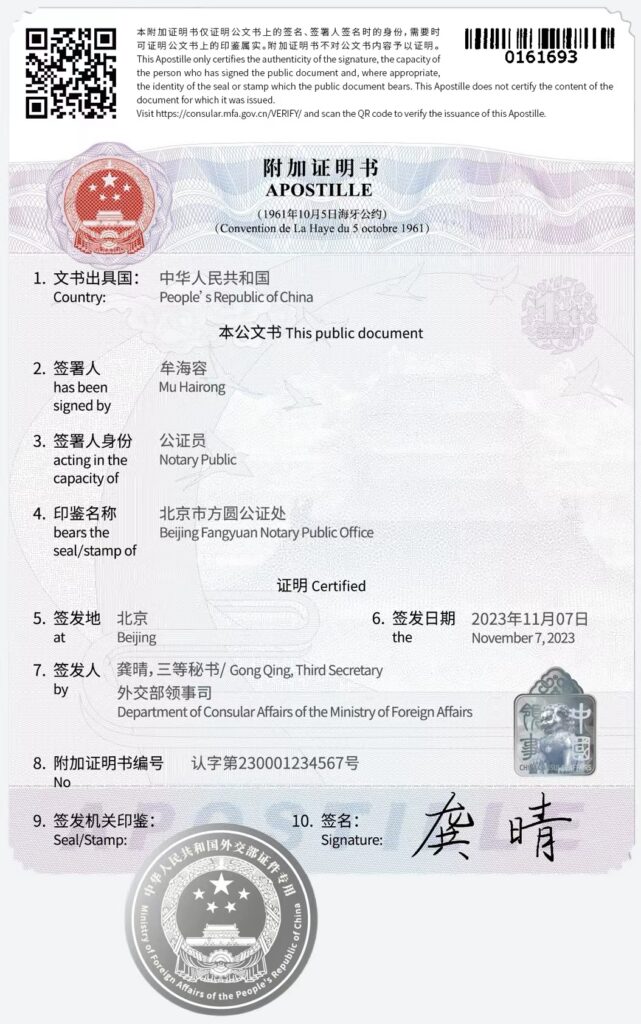Understanding Apostilles
Apostilles are certificates issued by governments in accordance with the 1961 Apostille Convention, which confirm the authenticity of documents. A document apostilled by Party A is considered authenticated by Party B, without a need to legalize or authenticate the document at a Party B’s embassy or consulate.
The Apostille Convention enters into force in China today, November 7, 2023. By doing so, China joins the more than 125 countries that were already signators to this Convention.
The Apostille Convention, also known as the Hague Apostille Convention, is an international treaty formulated by the Hague Conference on Private International Law. It specifies the methods by which a document issued in one of the signatory countries can be certified for legal purposes in all the other signatory states. Such a certification, known as an apostille, is recognized by all members of the convention, greatly simplifying the process of document authentication for international use.
China’s Embrace of the Apostille Convention
Without doubt, the adoption of apostilles by China is a development that will be welcomed by just about anyone who had to deal with the old rules. To illustrate how apostilles make life easier in practice, I will use a real-life example, involving friends in Seattle whom I will call Elena and Burt.
A Personal Story: The Impact of Apostilles
Earlier this year, Elena and Burt decided to have their toddler, Kim, stay for a few months with Elena’s parents, who live in Guangzhou. Kim is a U.S. citizen and she entered China on a family visit visa, with a permitted stay of 90 days. In case you are wondering, Elena was a U.S. citizen by the time Kim was born, meaning that she had already lost her Chinese citizenship and hence no claim of Chinese nationality could be made for Kim.
As Kim’s authorized 90-day stay neared its end, Elena’s parents began the process of applying for a visa extension through the local Exit and Entry Administration. The authorities requested an authenticated copy of Kim’s birth certificate. At that time, with the Apostille Convention not yet in effect in China, Elena and Burt faced a daunting three-step authentication process.
Authenticating Documents for China Before the Apostille Convention
Elena and Burt first had to obtain an authentication from the Washington State government, which issued the birth certificate. This part would have been relatively easy (and in fact the process is essentially the same as the one to obtain an apostille). In a pinch they could have driven down to the state capital of Olympia for same-day service. The real hassles would have begun at that stage.
Next, Elena and Burt would have to obtain an authentication certificate from the U.S. State Department (if they needed to authenticate a document issued by the federal government, Elena and Burt could have skipped to this step). According to the State Department’s Office of Authentications, it takes the office 11 weeks to process a request; in-person appointments are not offered. Finally, the document would have to be sent to the Chinese Consulate-General in San Francisco for legalization, most likely requiring Elena and Burt to engage the services of an agent.
The Advantage of the Apostille Convention
When Elena and Burt learned about the upcoming implementation of the Apostille Convention in China, they calculated that postponing the process until after November 7 would be more advantageous. With this strategy, they could obtain the necessary apostille directly from the Washington Secretary of State, bypassing any dealings with the U.S. State Department and the Chinese Consulate-General entirely.
China’s Accession to the Apostille Convention is a Welcome Change
China’s adoption of the Apostille Convention represents a major milestone for authenticating foreign documents. By simplifying and standardizing the process, China has removed a significant hurdle that created delays, complications, and costs.
Documents will no longer need to go through the bureaucratic maze of multi-step embassy legalizations. For those like Elena and Burt needing foreign document authentications in China, this departure from old procedures is a welcome step into a simpler future.

























